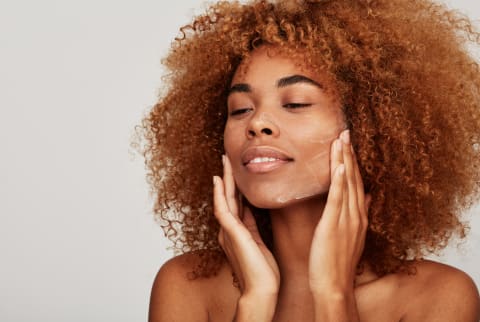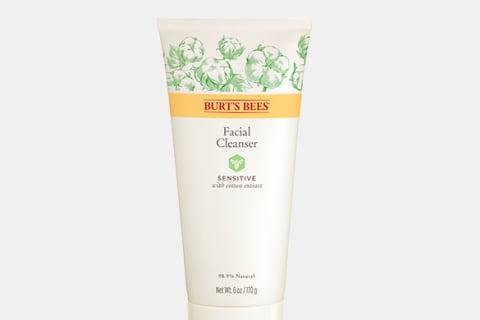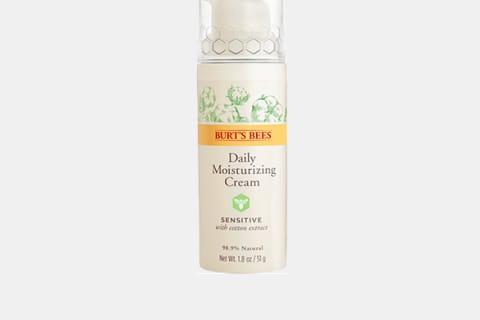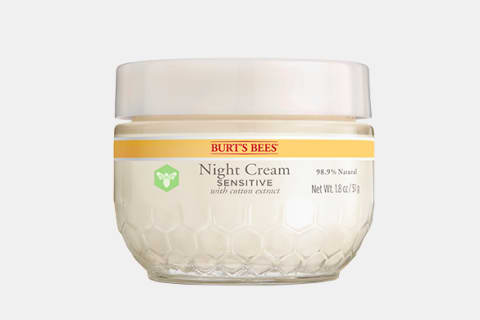Advertisement
Stressed-Out Skin? How To Identify Irritants & Find A Soothing Skin Care Routine

We've all been there: You wake up with some mystery irritation, deep pillow marks from the night's facedown slumber, or—gasp—a new array of pesky blemishes. Before poking, prodding, and getting as stressed out as your skin seems to be, take a deep breath and calm down. Then, go do anything else for 15 minutes to see if what's happening is a mere momentary flare-up. If the problem persists, allow yourself the time to do some quick visual detective work to see if you can identify the source of the problem and find short- and long-term solutions.
As board-certified dermatologist Samer Jaber, M.D., explains, "When your skin is irritated, many things can happen. It can become red, feel itchy or tight, may sting or burn, feel dry or bumpy, may flake or peel, and can crack and even bleed." If you're struggling to determine what's going on with your skin, consider the below before making any changes to your regimen.
Your environment.
Pesky pollution, water quality, and even heavy winds could be the source of your stressed-skin woes. If you're spending more time outside, exploring your city, or relaxing by a breezy beach on the weekends, consider your new environment's potential impact on the skin.
Make sure to soothe, hydrate, and protect your skin barrier, no matter where you are. Don't skimp on your cleansing, morning and night, especially if you're combating city pollution every day. Be sure to choose a product that’s designed for sensitive skin, like Burt's Bees Sensitive Facial Cleanser, so you can be liberal with your cleansing without worrying that you'll stress your skin out more. Always remember to wear an SPF, and if heavy winds are causing reactive redness in the moment and beyond, wear a hat and be mindful of where you're sitting, walking, or running. Sometimes, reacting to your environment before your skin does is half the battle.

Stress and/or nutrition.
There's a real possibility that the source of your flare-up comes from the inside rather than external factors. Take inventory of your stress level and what you've been putting into your body. Have you been eating dairy when you typically don't? Have you had a particularly intense week at work? Have the quarantine cocktails shown up on your face?
Samer Jaber, M.D., explains, "It's important to watch out for your diet; its effect on the skin has been studied, and we know that what you consume can definitely affect the skin. Acne can be triggered by a diet with a high glycemic index (a diet high in sugar, white bread, white rice, and simple carbohydrates). We also know that in some patients, dairy—particularly skim milk—can worsen acne. Alcohol, hot foods, and spicy foods can trigger rosacea flares. In psoriasis patients, obesity and alcohol may cause psoriasis to flare."
Consider the above, and try changing up your habits for a few weeks and prioritize what makes you feel at ease, whether that's morning yoga, lunch outside (hold the dairy), or a tech-free evening once your workday wraps up. Instead of getting wrapped up in finding a solution to the "problem" (your stressed/sensitive skin), embrace the positive, everyday actions that make you FEEL good, no matter what your skin looks like that day. The worst thing you can do is obsess and over-treat, especially if the problem comes from within. Seize the opportunity to make skin care a form of self-care, take the rush out of your routine, and take a minute to slow down. Be patient with yourself and your skin.
The products you're using (and how often).
Finally, consider your product haul, and whether or not your shelf is working for your skin while it's in a state of duress. If you notice consistent redness or sensitivity, you may be over-exfoliating. This can throw your moisture barrier, also known as the acid mantle, out of whack. To start, stick to exfoliating no more than two days a week to give your skin a break. According to Jaber, when skin starts to feel "tight, flaky, dry, and/or red," it may be time to hit the brakes on your exfoliation habit.
Then, try using products that are formulated for sensitivities, like Burt's Bees sensitive skin collection. Take the guesswork out of choosing products that are skin-safe for your stressed face by trying the entire collection. That way, you don't have to worry about combining ingredients that aren't complementary or are too harsh for your skin. And, finally, if you haven't already during these less-social times, ditch the foundation, and let your beautiful skin breathe.
Ultimately, the key is in the classic well-being paradox: Be mindful, but let go. Pay attention to factors that may be making your skin feel a little more stressed than usual, adjust your routine to optimize your unique sense of inner peace, and avoid obsession. If you feel balanced, your skin just might also. Rely on products you feel comfortable with, like Burt's Bees sensitive skin care. Take a deep breath and accept your stress, it's natural...just like the products you should use to alleviate it.



